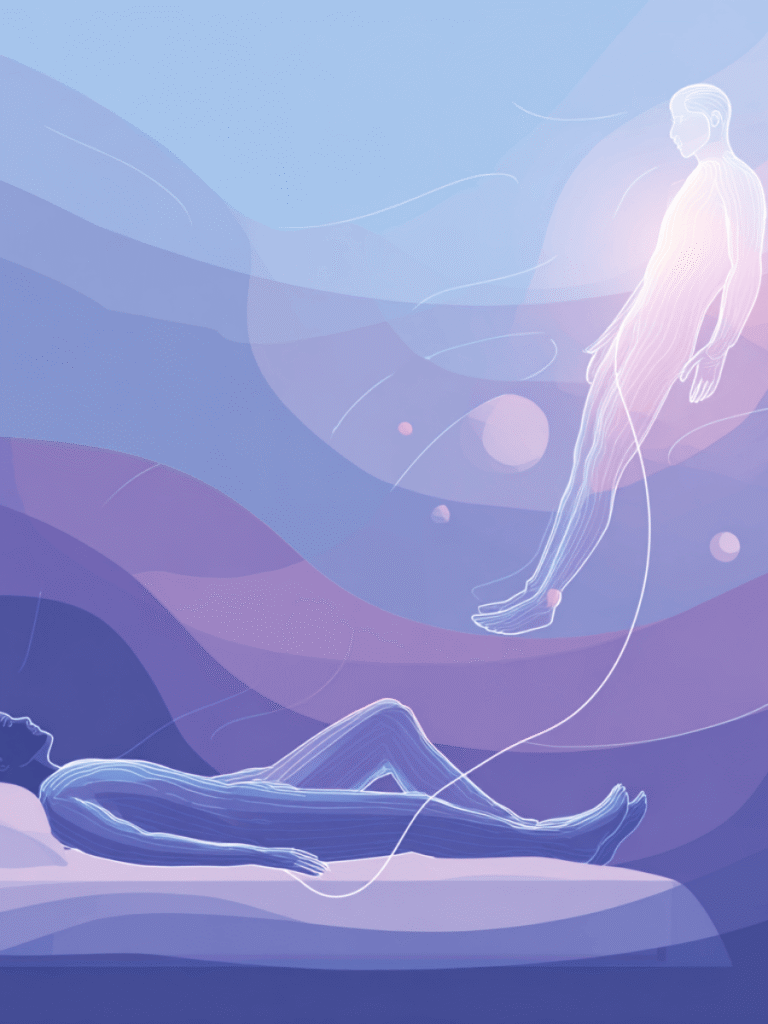Most people think sleep is a full-body shutdown. But what if it’s not? What if sleep is just 50% physical rest — and the other half is your soul wide awake, watching from the dark?
This is where lucid dreaming begins. That strange in-between where your body is asleep, but your mind knows what’s happening. You’re dreaming — but you’re aware. And when you’re aware… You have power.
Power to escape.
Power to fight.
Power to wake up.
Because sometimes, your dream turns into something else. Something confusing, seductive, terrifying, or just endless. And in that moment — when the clock hits 3AM and you realize you’re stuck — your spirit can rise before your body does. It can force you awake.
This isn’t fantasy. It’s spiritual warfare disguised as REM sleep.
Let’s break down how to recognize it — and how to wake yourself up when it counts.
Sleep Is 50/50 – Your Body Rests, But Awareness Remains: The Science Behind Lucid Dreaming
Sleep isn’t a complete shutdown of the mind; instead, it’s a delicate balance where your body fully rests while your awareness remains partially active. This unique state allows for lucid dreaming—when you become consciously aware that you’re dreaming and can even control the dream narrative. During certain sleep stages, especially REM sleep, parts of your brain stay alert enough to enable this fascinating phenomenon. Understanding how your body rests but your mind stays semi-aware is key to unlocking the secrets of lucid dreaming and enhancing your dream experiences.
✅ What’s Scientifically True About Lucid Dreaming:
- Your subconscious is active whether you’re awake or asleep. When awake, it handles habits and instincts. During REM sleep—the key phase for lucid dreaming—your subconscious dominates, processing memories, emotions, and symbolic content that often fuel vivid, controllable dreams.
- Your soul or spirit remaining “active” is widely held in spiritual traditions. Many believe it navigates the dream world while your body rests. In lucid dreaming, this awareness lets you intentionally focus or use willpower to trigger a conscious wake-up within the dream state.
- Waking yourself through willpower during lucid dreaming is real. Many lucid dreamers report twitching a hand, focusing on movement, or mentally saying “wake up” to break free from the dream. Neurologically, the brain can send motor signals during partial sleep paralysis, enabling this phenomenon.
What Isn’t Fully Proven by Science (But Spiritually Believed in Lucid Dreaming):
Science has yet to measure if the “spirit” itself directly causes physical movement during dreams. However, many spiritual perspectives align this with the idea that conscious awareness—or spirit—activates neural pathways, allowing motion even within lucid dreaming experiences.
Final Thought on Lucid Dreaming and Waking Awareness:
Yes—you can wake yourself from a dream. Whether through spiritual awareness, scientific mechanisms, or divine prompting, your body isn’t fully offline during sleep. In lucid dreaming, your spirit or conscious mind knows how to return to waking reality.
1. Your Spirit Can Reconnect Through Lucid Dreaming Awareness
In many dreams, your spirit explores other realms or spiritual spaces freely. But the moment you realize you’re dreaming—especially when prompted by a spiritual guide like an angel, the Holy Spirit, or another spirit—you can consciously trigger a return to waking. For example, a voice in your lucid dream might say, “Hey Susan, you’re dreaming, wake up,” prompting your awareness to shift back to the physical world.
2. Your Soul Navigates, But Consciousness Anchors You
While your spirit moves, your soul often uses imagination to navigate the dream. However, your consciousness remains tied to your physical body. This is why, even in a dream, you might say things like, “I need to go to work,” or “Hurry up, I have somewhere to be.” These physical-world thoughts can trigger your spirit to return and wake you up.
3. The Silver Cord: Your Spirit’s Anchor
Ecclesiastes 12:6–7 mentions the ‘silver cord’—a symbolic and spiritual connection between the body and the spirit. It represents how your spirit is wired to your physical body. This energetic cord allows your spirit to be pulled back into your body when the time is right, especially through conscious intention.
4. Willpower Can Trigger Physical Awakening
By focusing and exerting inner will, your consciousness can activate specific parts of your body—like fingers, legs, or chest—to wake up. It’s not magic; it’s neural activation. Your body responds to conscious focus, even when you’re asleep. Many people have willed themselves awake by focusing on movement.
5. Angelic Alarm Clocks and Divine Nudges
There are moments when an angel or divine being can physically tap your body with energy—especially when you’ve planned to wake up to pray, act, or avoid danger. This supernatural nudge acts like an alarm clock for your spirit, jolting you back to awareness.
6. Physical Sounds Can Pull You Out
External sounds—like your mother yelling your name, a sibling screaming for chores, or even a sudden knock—can travel into your dream and shake your consciousness awake. These triggers remind your mind that it’s still tethered to a physical space, prompting a return.
7. Final Thoughts: You’re Not Powerless
To wake yourself from a dream is not just a brain glitch—it’s a real interaction between your spirit, your soul, and your physical body. Whether it’s through internal will, divine prompting, or physical stimuli, you can train your awareness and wake up on command. The more intentional you become, the more control you’ll have—even in your dreams.
Sleep is not a total shutdown — it’s a dance between rest and awareness. Lucid dreaming shows us that even while our bodies recharge, our minds and spirits stay active, holding the power to wake up when it matters most. With practice and intention, you can learn to navigate this space and take control of your dreams — and your reality.
8. Lucid Dreaming and Divine Deliverance: How God’s Glory Awakens You from Spiritual Nightmares”
The Bible vividly reveals how God delivers His people from darkness and fierce enemies. David declares that even if he descends into the depths, God is there as his shield and protector. This spiritual warfare shows God’s glory and radiant presence manifesting to rescue His children. But experiencing this divine intervention requires a personal relationship with God—a life growing in reverence, submission, and alignment with His will. In those terrifying dreams or underworld journeys, the brightness of God’s glory can disperse all perverse energies and surround you with divine grace. This sacred radiance is one of the key ways to awaken from nightmares and claim victory over darkness.
Can lucid dreaming be a form of spiritual warfare or divine awakening?
Yes. Lucid dreaming can serve as a battleground where spiritual forces interact, and through a personal relationship with God, His radiant presence can intervene—dispersing darkness and helping you wake from nightmares with divine grace.




